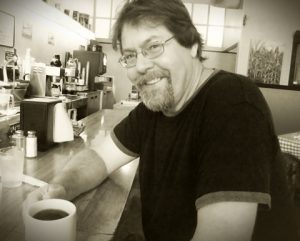Today’s post comes to you from novelist Alex Bledsoe. He has been a reporter, editor, photographer, and door-to-door vacuum cleaner salesman. Today he’s the proud author of the Eddie LaCrosse series, the Memphis Vampires series, and The Hum and the Shiver (the text of which I reviewed here, and the cover of which made my list of favorites for 2011). His website is AlexBledsoe.com.
A character’s name is one of the most important things the writer has to discover. The way a name sounds, the way it looks on the page, even the way it’s spelled can make the difference between forgettable and archetypal. Sometimes the name seems inevitable, while for other times, the character may go through a half-dozen before finding one that fits.
Ian Fleming took the name “James Bond” from the author of an ornithological guide lying around his Jamaican home, because he wanted a bland, forgettable name, one perfect for a spy. Indiana Jones (originally “Indiana Smith”) was named, not after the state, but after George Lucas’s dog. In both cases the names already existed in other contexts, but the writers recognized that they fit their fictional characters. The same thing recently happened to me: in my upcoming novel Wake of the Bloody Angel, I realized author Rhodi Hawk’s name perfectly suited a character. I changed the spelling, and of course asked if the real Rhodi would mind. Luckily for me, she was delighted.
Sometimes you can work with the wrong name for a long time without realizing it. Margaret Mitchell’s heroine was called “Pansy” until almost the last minute, when she changed it to “Scarlett.” Luke Skywalker was originally the far more martial “Luke Starkiller.” In my own case, my hero was named “Devaraux LaCrosse” for over a decade’s worth of unpublished drafts, until I was suddenly struck by the idea that he needed a normal, everyday name and he became “Eddie” for his debut, The Sword-Edged Blonde.
Many heroes have names that conform to a system. In Superman mythology the initials “L.L.” are far more prominent than they would be in real life: Lois Lane, Lana Lang, Lex Luthor, Linda Lee. I mean, really: what are the chances of one guy having two girlfriends, and an arch-enemy, with the same initials? The absolute master for naming within a system was undoubtedly J.R.R. Tolkein: for example, the people of Rohan are expert horsemen, and so their names (Eomer, Theoden, Eowyn) incorporate “Eo,” the Anglo-Saxon prefix for “horse.” In my novel Dark Jenny, the setting and many of the characters were based on Arthurian legend, so I sought names that evoked, even if only tangentially, their origins. Lancelot, for example, becomes Elliot Spears (lance, spear, get it?); Morgan becomes Megan; Guinevere becomes Jennifer, and so on. I kept a couple of names as-is, but used them as surnames with normal first names (“Bob” Kay and “Ted” Medraft).
And on occasion, the naming gods simply smile on you. The characters in The Hum and the Shiver were named with very little forethought, with the only criteria being that they had to have Celtic origins. But it turned out that the names fit the personalities better than I ever realized. The protagonist’s name, Bronwyn, means “dark and pure.” The impulsive youngest child is named Aiden, which means “fiery.”
But the real master for names, hands down, just celebrated his 200th birthday. Charles Dickens came up with names that both sounded great and conveyed their bearers’ personalities: Ebenezer Scrooge, Noddy Boffin, Bob Cratchit, David Copperfield, and Martin Chuzzlewit, to name just a handful of his best known.
There are as many approaches to naming as there are characters to name. I’m currently working on a novel that takes its basic plot dynamics from Shakespeare, which of course means I can raid lists of Shakespearean names. Another work in progress takes place in a particular geographic area, so it’s off to find out what family surnames are found in that area. One day, I might even create a character as archetypal as James Bond or Scarlett O’Hara. Heck, maybe I already have, and I just didn’t get the name right.
If you appreciated Alex’s post, be sure to pay his blog a visit.





Great post, Alex. Sometimes the best character names just come to me; I can’t imagine my series The Dark Lines without Topher and Blake (the two narrators), and those were names that just popped into my head. But sometimes the right name takes a while; in one of my upcoming novels the narrator was named Jesse until I realized that I use “J” names for boys way too often. I couldn’t think of another name, so I ended up naming the character after my daughter’s friend who gave me the idea for the story, and suddenly the character had a whole new dimension I hadn’t even thought of until the name change.